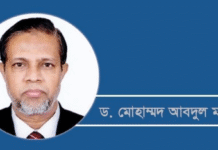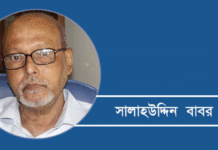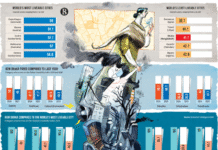Sadeq Khan
If the purpose of declaring the schedule of Dhaka City Corporation election after decadal delay and its bifurcation (along with Chittagong City Corporation election as well) was meant to create a diversion of public mind and of geo-political watchdogs, both government and non-government, from the ongoing unrest and law & order situation, the strategy has impacted not with a bang but a whimper.
Albeit a number of weighty candidates of the ruling party and its obliging pet parliamentary opposition are afield trying to warm up public interest in the scheduled city polls, the voters are showing no signs of enthusiasm, terribly oppressed and insecure as they are under the pincers of police raj and life-threatening extortions on the one-hand and months of opposition bomb-throwing transport blockade on the other.
The agitating 20-party opposition alliance leaders have modified their routine hartal programme last week in the second spell of 48 hours ahead of the National Day. Instead of hartal, countrywide protest demonstrations against abduction, extrajudicial killing, mass arrests and trumped-up criminal cases implicating 20-party leaders and supporters have been announced by the agitating opposition movement. That led to media hype that the mainstream opposition party BNP and its allies would join the coming city polls and move away from their “ineffective”, now 11-weeks old, transport blockade programme.
But public confidence in the electoral exercise under the incumbent set-up is far from restored, and their lack of interest as yet in the city polls campaign remains apparent in street conversations and in television pictures, for all the supporting crowds put up on show by ruling party candidates. Nor has the BNP as yet decided whether to participate or to back any candidate of their choice in the supposedly non-party local Sof Chittagong.
Bidders for militancy
And so far as the “ineffectiveness” of the on-going 20-party agitation is concerned, contrary to the propaganda of the ruling coterie, the sustained movement has created a deep impression, both within the country and without, of the “ineffectiveness” of the government. The mainstream opposition is indeed progressively being perceived as more consistent in their demands and “resilient”, and the government leaders as desperate “bidders” for militancy by crying “wolf”, “wolf” to hang the 20-party opposition by giving it a bad name, and to save its usurped power. As a commentary in The Wall Street Journal of March 23 observes (abridged):
“A heavy crackdown on antigovernment protesters in Bangladesh has been fuelling anger and fear within the country’s opposition movement, creating an opening for militant extremism to take root here, rights advocates and others say. More than 100 people have died since January, when supporters of the main opposition Bangladesh Nationalist Party and its ally, the Jamaat-e-Islami, took to the streets to call for early elections. Police have arrested thousands of activists and banned the opposition groups from holding demonstrations. The opposition has defied that ban, leading to clashes across the country.
“As police respond to the violent protests with tactics that critics allege include stifling political speech and carrying out extrajudicial killings, rights advocates fear that militant groups could be better positioned to attract new recruits from among embittered opposition sympathizers in this country long known as a bastion of moderate Islam. ‘If democracy is undermined, militancy could rise’, said Shahdin Malik, a civil-rights lawyer in Dhaka. ‘There is very little political space for dissent right now.’
“The government denies that it is curbing political speech or carrying out extrajudicial killings. Mohammed Nasim, a senior minister who often acts as a government spokesman, said the administration would allow ‘peaceful and democratic’ political activities but would crack down on ‘anarchy and terrorist activities.’ The Inspector General of Bangladesh’s national police, Shahidul Hoque, said security forces only open fire in self-defence.
Militants outside could take advantage
“If all avenues of political discourse are closed, Islamist parties that are part of electoral politics here could renounce the political system and become our Taliban’, said Badiul Alam Majumdar, the secretary-general of Citizens for Good Governance, an advocacy group that campaigns for transparency in government. ‘Militant groups from outside could also take advantage of the upheaval.’
“Bangladesh’s political turmoil is rooted, in part, in the highly contentious re-election of Prime Minister Sheikh Hasina last year. Ms. Hasina scrapped a provision in the constitution that required an interim government to take over during elections. The opposition then boycotted the polls, accusing Ms. Hasina of authoritarian tendencies. Opposition groups have called on her to step down and allow new elections. For her part, Ms. Hasina has referred to BNP leader Khaleda Zia, as a ‘terrorist’, and her aides have compared the BNP, which has long been regarded as a centrist political party, with the militant group Islamic State for trying to impose a nationwide blockade of road, rail and river transport to press its demands.
“As the government has sought to curb upheaval, local and international rights groups say they see a pattern of deaths among people being held by police or during what security forces describe as encounters with people they claim are terrorists or criminals. These deaths, they say, amount to a form of illegal execution.
A former police inspector general, Nurul Huda, declined to speak directly about alleged extrajudicial killings. But, he said, ‘the demands on the police forces to maintain public order have increased disproportionately due to the current turmoil. When the police are overstretched, civil liberties and due process sometimes suffer.’
Independent investigation needed
“Abul Bashar, a 32-year-old Jamaat-e-Islami activist, says he has been afraid to spend the night at his home for more than a year, fearing police would kill him if they arrest him. Mr. Bashar says he is wanted by police on suspicion of participating in firebomb attacks. He denies any involvement in the attacks, which he said happened in his hometown in central Bangladesh while he was in Dhaka: There’s no law, no protection for us. People have lost friends, brothers and have been driven from their homes. They’re getting desperate.”
A more out right condemnation of the government’s failure to uphold civic rights was issued by Human Rights Watch in its March 17 statement: “The Bangladeshi authorities should immediately order an independent investigation into the enforced disappearance of Salah Uddin Ahmed, spokesperson and joint-secretary of the opposition Bangladesh National Party (BNP). Ahmed was last seen on the evening of March 10, 2015 when, according to an eyewitness, he was taken away by men identifying themselves as belonging to the Detective Branch of the police. The government has denied involvement or knowledge of his whereabouts.
Despite complaints to the police by Ahmed’s family members and the filing of a case with a court by Ahmed’s wife demanding that the government produce him in court, Ahmed has not surfaced. On March 16, the Inspector General of Police, responding to a Dhaka High Court order, reported that the various security services under his control had not detained or arrested Ahmed. The court found there was little evidence to show that the police had conducted a serious investigation, but then adjourned the hearings until April 8.
History of failing to investigate
Brad Adams, Asia director at Human Rights Watch said: The Bangladesh government has a history of failing to investigate the enforced disappearance of opposition members. Ahmed’s forcible disappearance needs a credible and independent investigation. This should happen urgently, since by April 8 it could be too late.
“Human Rights Watch and other groups have documented enforced disappearances in Bangladesh, largely by members of the security forces since at least 2007. In 2012, BNP leader Elias Ali also went missing, and the authorities have failed to determine his fate. In May 2014, Bangladesh authorities ordered investigations of members of the Rapid Action Battalion (RAB) for their role in the abduction and apparent contract killing of seven people in Narayanganj, but only because of intense media scrutiny. RAB officials had earlier denied their role, but were exposed after the corpses, drowned in a lake, accidentally floated up.
Ahmed’s disappearance comes in the midst of an ongoing violent stand-off between the government and opposition parties, which began in early January 2015. Since then, over 150 people have died and several hundred have been injured, largely when defying opposition enforced blockades known as hartals. The government’s response has been to arrest thousands of opposition members across the country. The current wave of violence in Bangladesh is a continuation of a longstanding disagreement between the government and the opposition surrounding the conduct of national elections held in January 2014. Several hundred people were killed or disappeared before and after those elections.
“Ahmed’s disappearance is part of a larger pattern, unfortunately, the denial of any involvement by the Bangladesh government, and its refusal to take meaningful action to investigate, is also part of the same pattern of behaviour.”
Crying wolf wolf is hardly helping to improve the government’s credibility. Its denial of gross malfunction and wrong-doings are equally failing to gain credence.
Source: Weekly Holiday









